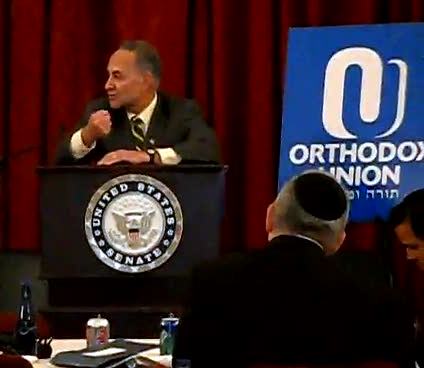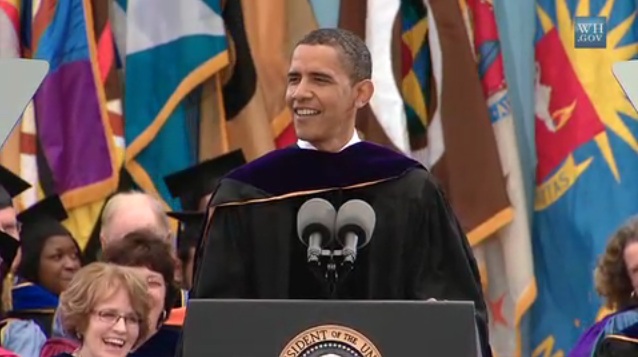In his commencement address at the University of Michigan last month, President Barack Obama bemoaned the radicalization of American political discourse. "Today's poisonous political climate," he said, serves to "push people away from participation in public life."
He urged the newly minted graduates not to lose hope in an environment of name-calling, partisanship, and special interest lobbying. "On your willingness to contribute part of your life to this country," he said, quoting John F. Kennedy, "will depend the answer to whether a free society can compete."
For President Obama, what makes the present-day political climate "poisonous" is the prevalence of personal attacks, "vilification and over-the-top rhetoric." In his speech, he complained about the casual use of incendiary terms such as "fascist" and "socialist" to denigrate the political views of one's opponents. Nor is such irresponsible language limited to political disagreements; earlier this month, for example, a South Carolina state senator referred to a gubernatorial candidate of Indian descent (from his own party) as a "fucking raghead."
In making his argument, however, Mr. Obama assumes that it is only rhetoric that has been radicalized -- without a corresponding radicalization of government policy. After all, is there not a discrepancy between the majestic vistas promised by Obama, the candidate, and Obama, the orator, and the depressing realities heralded under the tenure of Obama, the president?
As Jon Stewart recently remarked, addressing the president, "You complained when Bush wanted to read Americans' mail without a warrant" - but now support extraordinary rendition, oppose habeas rights for terrorism suspects, and order the assassination of American citizens on foreign soil. The greater threat then, it seems, is not from poisonous rhetoric but from poisonous policies that are put forth under the guise of mainstream political discourse.

Sen. Charles Schumer (D-NY) advocates economically strangling Gaza in an address (4:25) to the Orthodox Union on June 9, 2010
Two weeks ago, the senior senator from New York, Charles Schumer, in a speech to the Orthodox Union, said that it "makes sense" to "strangle [the Palestinians in Gaza] economically." "There should be humanitarian aid and people not starving to death," he quickly followed up, but his qualification only underscored the brutality of his suggestion. Nor was Sen. Schumer speaking in a fit of passion; the video shows the cool-headed, rational Harvard-educated lawyer calmly miming the action of strangling with his clenched right fist. "I think the boycott is important for bringing about peace in the Middle East," he smirks, before laughing awkwardly and drawing cheers from his Orthodox Jewish audience.
Numerous critics have assailed Mr. Schumer for advocating "collective punishment" -- a war crime under the Geneva Conventions. Professor Juan Cole of the University of Michigan went so far as to draw parallels between the senator's suggestion and the Nazi policy of Sippenhaftung under which relatives of political dissidents were systematically persecuted by the state.
Sen. Schumer's remarks echoed throughout the world given his stature as one of the most influential members of Congress, they were perceived, not just as his personal ramblings, but as a reflection of US foreign policy. The vivid image of our government complicit in the strangling of a civilian population was seared into the very hearts and minds we had been striving to conquer. Even more disturbing than the effect abroad, however, was the effect at home.
One can understand legitimate differences of opinion on foreign policy. But Sen. Schumer's offensive remarks left many feeling disgusted. Before he was elected to the Senate, Mr. Schumer spent 18 years in the House representing a diverse and vibrant district in south central Brooklyn. Growing up, I attended middle school with his elder daughter and watched my parents vote for him in several elections. Now, I tried to imagine how a young Palestinian-American living in New York might feel hearing their elected representative advocate the economic strangling of the men, women, and children of Gaza.
The issue is about much more than hurt feelings. In a highly charged climate driven by fear, irresponsible rhetoric easily becomes the fuel behind hate crimes and intolerance. In the past month alone, a pipe bomb was set off at a Florida mosque, a Texas radio host advocated blowing up a proposed mosque in New York City, and Muslims were assaulted in bias attacks in California and New York. Remarks such as Mr. Schumer's serve to further marginalize already victimized communities.
Sen. Schumer's simplistic construct of 'We Americans should strangle Gaza' - with its familiar delineation of 'us' versus 'them' - explicitly rejects the possibility that there may be any overlap between the two groups. According to the Arab-American Institute however, there are more than 250,000 Americans of Palestinian descent - in fact, New York is home to their 5th largest concentration. But Mr. Schumer isn't just antagonistic to his Palestinian-American constituents; for him, it's as if they don't exist.
The experience of dispossession that has been so prominent in the Palestinian experience is doubly salient for Palestinian-Americans. First, as Palestinians, they were expelled from their homes and denied their right to self-determination. Then, as Americans, they found themselves consigned to a perpetual state of 'otherness' - twice treated as strangers in their own land.
Palestinian-Americans in New York whom I spoke with were unified in their vehement rejection of Sen. Schumer's comments. Randa Wahbe, 23, a graduate student in public health at Columbia University found his words "racist and cruel." "When a US Senator justifies the inevitable deaths of Palestinian children because 'they don't even believe in the Torah' and is not even forced to issue an apology," she said, "there is something deeply flawed with the mainstream political discourse in our country."
"As a Palestinian-American, I have become used to the mainstream media turning a blind eye to the suffering of Palestinians," said Alaa Milbes, 21, a graduate student in Middle East studies at Columbia University. "I am not surprised by Sen. Schumer's hateful and inhumane comments."
Remi Kanazi, 28, a Palestinian-American poet and writer from Brooklyn expressed his frustration at watching "our elected officials stand on the front lines and promote the starvation of a people." Indeed, in a political climate that increasingly seems to reward radicalism, Sen. Schumer's remarks are far from anomalous. Several members of Congress from New York have joined together to reject demands for an international investigation into the deaths of nine civilians in the flotilla incident; instead they have called for sanctions against the surviving members of the humanitarian mission. For his part, Sen. Schumer has refused to acknowledge that his remarks may have been inappropriate. Our numerous attempts to contact his office for comment were unsuccessful.

Pres. Obama criticizes the influence of special interests and lobbyists during his commencement address at the University of Michigan on May 1, 2010
"When we choose not to make our voices and opinions heard, that's when democracy breaks down," said the speaker at the University of Michigan commencement in May. "That's when power is abused. That's when the most extreme voices in our society fill the void that we leave. That's when powerful interests and their lobbyists are most able to buy access and influence in the corridors of Washington - because none of us are there to speak up and stop them."
A powerful exhortation to hold elected representatives accountable for their words and actions - if only Pres. Obama and the rest of the Washington politicians could have heard him.
Hamdan Azhar recently graduated from the University of Michigan with a master's degree in biostatistics. In the fall, he will join the University of Chicago as a Ph.D. student in integrative neuroscience. He previously holds a bachelor's degree in economics from Penn State University. An acclaimed writer on international affairs, he is a native of Brooklyn, New York.